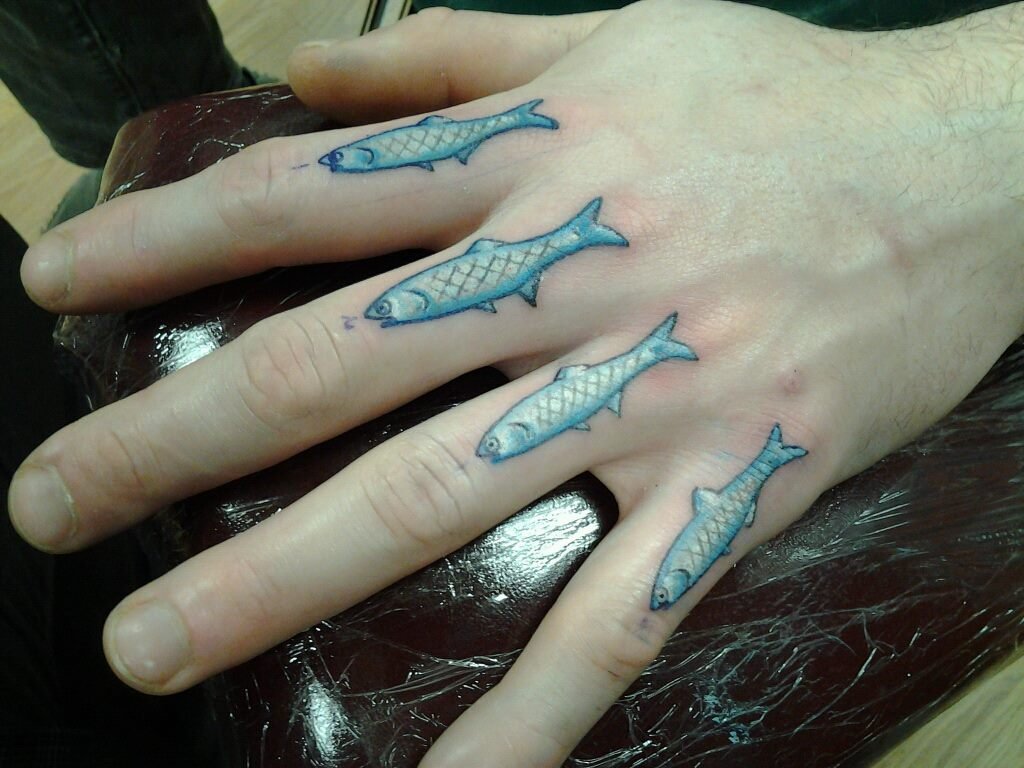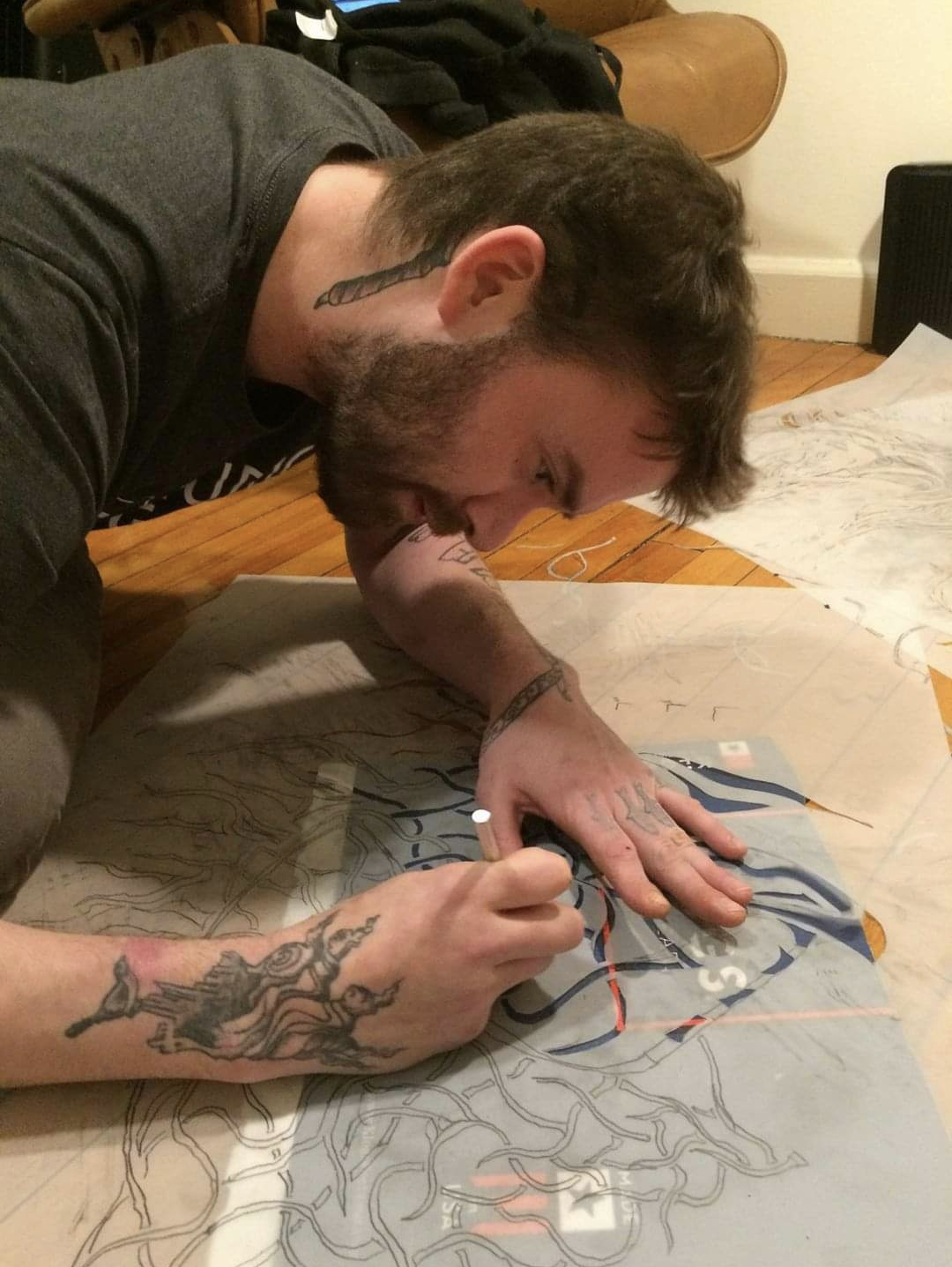Jesse’s Story: Epilogue
Jesse’s sardine tattoos
“Set me as a seal upon your heart, as a seal upon your arm: for love is strong as death.” –Song of Solomon 8:6
In this first month since my son’s death, I’ve managed to stay afloat. Reading and responding to cards, emails, texts, and social media comments have been cathartic. I find myself drifting on that vast but well-charted ocean of grief – for each wave crest of normalcy, an offsetting wave trough of depression. When talking about grief, it somehow feels right to turn to metaphor, to make that leap beyond the rational.
In my more buoyant moments, I catch sight of the horizon and, with luck, landfall. When I’m deep in the trough of a wave, all I see is steel blue water. In those darker moments, the same movie plays in my head, over and over: Jesse as he’s about to be struck by the Ford Bronco, in slow motion, that flash of realization in his eyes, the awful impact of steel on bone, the cracking of vertebrae. And then, me kneeling in the median grass, cradling his head in my lap, beholding his broken body, weeping. And then, me appearing beside him just before he walks into traffic, grabbing his arm and swinging him around, the two of us hugging as cars whiz by.
This pattern of highs and lows is similar to how it felt all those years as the parent of someone with an addiction (and how it feels, I’m sure, for someone with an addiction): the bright hopes of rehab and sobriety, the deep disappointments of relapse. I imagine this is something like the highs and lows of the bipolar disorder that presented in Jesse in his early twenties: the euphoric and creative hypomanic phase, followed by depression that fills the void when the elevated and energizing mood has vanished. And how similar to the stressful daily routine of a restaurant chef: Hours of prepping the night’s specials and other menu items. The mad rush of the dinner hours, orders pouring in, a string of tickets hanging above each workstation. Then winding down by midnight, putting food away in the walk-ins, planning and ordering supplies for the next day, and ending with a drink or two or three.[1]
When Jesse was hypomanic, too wired to sleep, he’d come home from his job and, even when not drinking, stay up all night. He’d work on some art or bike project, waking us up. I’d go down to the basement. “Jesse, could you please go to bed?” He’d grimace and shake his head, knowing I didn’t understand. In those moments, I’d recall when he was little, when I could put him to sleep by singing a song and rubbing his back, and wish I could still do that.
* * *
One memory of Jesse transports me to 2015. It had taken a lot of gentle persuasion to get Jesse to the point of giving rehab a try. Although less than enthusiastic, he was well aware the counselors were offering him tools and strategies that could help him make healthier decisions. Pat and I participated in the family sessions held on Sunday afternoons, and were feeling hopeful when he graduated from the program that December.
The rehab center found a placement for him in a sober living house in Minneapolis. Although we would have been happier if he were closer to home, we knew this could be an important step for him. He had begun scouring websites for sous chef jobs in Minneapolis. I helped him load his possessions into my car and drove him 300 miles north. After paying his first month’s rent at the house, I helped him haul the boxes up to his second floor efficiency, gave him a big hug, and drove home.
When we called the main office the next evening to see how he was doing, we learned he wasn’t living there, that he’d gone out for dinner with some housemates and had returned drunk. Per the house’s rules, he was banned from staying there, and they had no idea where he was.
The next day, not having heard from Jesse, we began to call police stations and hospitals. This went on for a week. We were distraught, trying hard to ignore the darkest possibilities – January in Minneapolis can be brutal.
We finally got a call from him. He was sleeping on a couch in a communal house. The good folks there had found Jesse panhandling on the streets and taken him in. I drove to Minneapolis and picked him up, and we retrieved his gear from the sober living house and returned to Iowa City. Not much conversation on that long drive – I saw no value in reminding him of what he already knew, and Jesse was withdrawn, ashamed of his failure to live up to our hopes, and his. Pat and I never did hear the whole story of that week.
The next summer, lacking a steady chef job, Jesse found a temporary haven at Echollective Farm in rural Cedar County. Led by Derek Roller, former co-owner of The Red Avocado,[2] the farm had been in operation for fifteen years by then, both as a CSA and a supplier of produce to various businesses. Jesse pitched his tent at the far end of the fifteen acres of farmland he worked during the day. He seemed happy. On one of my visits, he showed me a barn filled floor to ceiling with crates of seed garlic, the farm’s specialty, ready to be shipped out. Working on the farm became a way for him to get some distance from bad habits he’d cultivated. But he usually came into Iowa City on the weekends, sometimes getting a ride from one of the farm crew, sometimes asking me for a lift. This poem emerged from one ride returning to the farm.
Driving with Jesse
I’m driving my son Jesse
25 miles into the countryside
to the farm where he lives and works.
It’s 10 PM and 80 degrees,
and we’re done with the small talk.
Cruising the two-lane blacktop at 60,
all the windows rolled down,
we let our speed invent a wind
from the still summer heat.
We rush through a restless night,
sensing shifts in temperature – warmer
as we crest a hill, the slight frisson of a chill
as we dip down to cross a creek.
At one point we drive through
the almost visceral funk of a dead skunk.
Except for the occasional glare of headlights,
nothing else distracts us from our meditations.
I want to remind Jesse the red-winged blackbird
tattooed on his shoulder blade is indeed black,
but its red and gold epaulets were earned
through acts of fearless tenacity.
But we each abandon ourselves to the moment
or wrestle with our thoughts – I don’t know –
as I deliver him to the darkness and silence
and next step in his journey.
* * *
Jesse posted the above photo on social media with this caption:
Considering the stage of life I’m in, it would be so easy just to drift through it.
But I wake up to this shit.
All I can think about is moving forwards.
16 July 2022
I’m still amazed by my son’s ability to maintain a positive outlook despite all the obstacles he faced. Like other unhoused people, Jesse dealt with daily scarcity, which often brings out the worst in people. I know he wrestled with despair and cynicism, but I also know he was determined to be better than that. Two other recent social media posts from Jesse evoke his efforts to share his goodness with the world:
On my backpack, I have two side pockets where I usually keep water bottles. I reached back for water and found candy and NarCan. Now, I don’t use any drugs that would require NarCan, but I know some people that do. I hope I never have to use it, but I feel it is important to carry.
I thought that if I have to revive someone, it would be like going to the dentist when they give you a sucker afterwards. If I have to bring you back from death, you get a sucker. No, you get two. Fuck it, you can have the M&M’S too. Welcome back to life.
28 December 2023
In recent days I’ve had two people who I have not seen in a while come by the area where I live, asking about me and how I’m doing. Crazy to think about it because no one does that shit. Apparently I made an impression.
The homeless community usually only operates according to their own desires and needs. To find out that people are coming back and seeking me out makes me worried for them. I wish them the best; I can only do so much. These are good people.
If you can, I ask that you hold Angelina, Mayra, and Native in the light; I hope that they find their way.
5 January 2024
* * *
Jesse and Lilia
“Move forward now, there’s nothing to do/ Can’t turn around, I can’t follow you/ Your coat’s in my car, I guess you forgot/ It’s crazy, the things we let go” –The National, “Weird Goodbyes”
Lilia and I zoomed a week ago. Lilia, who now lives in Berlin, who had written to me after Jesse’s death, “He was my home, my better half, the light when I was dark. My love for him will never die.” There were tears, but it felt good to see her and talk, a grace to know the best parts of Jesse live with her. She mentioned that she’d like to have a more tangible remembrance of Jesse.
I realized I might be able to provide that. After Jesse left Iowa City and moved to New York to be with Lilia, I took on the Herculean task of cleaning out his apartment, hoping to recover some of our security deposit. Because I’m that guy who hates to throw anything away, I packed up a dozen boxes of odds and ends, the residue of his two years there. Who knows if he might need some of it at some point? When I spoke with Lilia, those boxes were still under the basement stairs.
I began to unpack. Beans and grains, ten different vinegars. (Does vinegar ever go bad?) His bass guitar amp. Two crates of bike parts and accessories and tools, which I donated to the Iowa City Bike Library. And a box of clothes, which I washed and folded and tucked away in a box for Lilia.
I also discovered a box of Jesse’s art supplies: tubes of acrylic paint, spray paint cans, X-acto knives, glue gun and sticks. In an art portfolio bag, I found one plastic stencil sheet Jesse had worked on. I remembered him cutting out these painstakingly detailed designs and then printing them on t-shirts he wore or gave away or sold on consignment at White Rabbit.[3] I’m looking forward to learning how to print his stencil design on some t-shirts. It’s a wonder the lift this plan has given me.
* * *
“We shake with joy we shake with grief/ What a time they have, these two/ Housed as they are in the same body.” –Mary Oliver, “We Shake with Joy”
On an unseasonably warm late February day, I visited a homeless encampment on an otherwise vacant property on the east side of the Iowa River. The camp is near the intersection of West Benton and South Capitol, tucked beside a railroad spur and at the edge of a concrete lot that once served some forgotten industrial warehouse. It feels like a brownfield. Scattered along the treeline above the riverbank are ten or twelve brightly colored camping tents or jerry-rigged tarp shelters.
I suspect most of these folks were living nearby last summer, in a spot under the Benton Street bridge called The Quarry, but a fire broke out there in October, leaving them even more unhoused than they already were. The city came a few days later with bulldozer, backhoe loader, and dump truck to remove all evidence of the camp’s existence and then lock the area behind a chain link fence.
It was noon on a Saturday. I parked my car on the street and walked across the lot toward the camp. A gray-bearded man close to my age was working on a bicycle. I noticed clothing hanging on makeshift laundry lines, and scattered piles of bikes and bike parts, transportation for the unhoused.
As I approached the tents, I called out “Howdy!” sounding as friendly as I could to assure the man I wasn’t there to cause trouble. “How ya doing?” I told him, “My son Jesse – he was living unhoused in Austin, Texas, for the last year and a half.” Another man poked his head out of his tent, scowling at first. “Earlier this month he was hit by a car and died.”
They expressed their sympathy, “Aw man, we’re awful sorry about that.”
“Thanks. Well, the reason I stopped by is, I have his wallet.” I pulled it out of my satchel. It was a clear plastic zippered bag, like a package for store-bought pillow cases. “It’s not a lot of money, but I think he’d want me to pass it on to someone like you all, someone living like he was.” I handed Jesse’s wallet to the man with the bicycle.
“Hey, that’s mighty nice of you. We’ll be sure to divvy it up.”
“Thanks.” I looked around for a moment at their site, the ashes of their campfire. “Well, you all take care of yourselves.”
As I started to walk away, the man with the bicycle called out, “What did you say your son’s name was?”
“Jesse was my son.”
“Okay, good. Be sure to thank Jesse for us.”
* * *
Footnotes
[1] The Emmy Award–winning TV series The Bear provides a fairly accurate depiction of this experience.
[2] An excellent Iowa City restaurant that specialized in vegan and vegetarian fare until its building succumbed in 2012 to ruthless real estate tactics.
[3] A wonderfully funky Iowa City shop with a focus on local and handmade clothes, which, sadly, closed recently.




